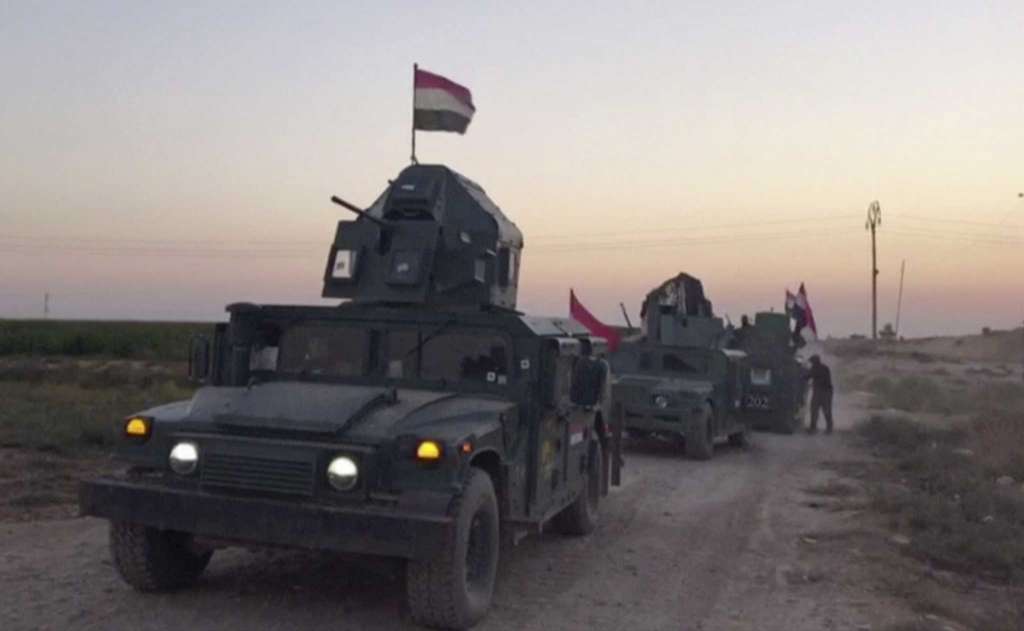Iraqi government forces launched on Monday an offensive to retake territory seized by Kurds in Kirkuk in what is seen as response to last month’s Kurdish independence referendum, which was rejected by Baghdad.
The forces have so far seized a swathe of countryside surrounding the oil city of Kirkuk in a bold military response to the September 25 referendum in which an overwhelming majority of Kurds voted in favor of independence.
Baghdad and the Kurdish region have long been at odds over the fate of Kirkuk, a dispute that has grown more bitter since the vote.
The government said its troops had seized Kirkuk airport and had taken control of Northern Iraq’s oil company from the security forces of the autonomous Kurdish region, known as Peshmerga.
Iraqi oil industry officials said there was no disruption to production from the facilities of the Company, which is based in Kirkuk and one of the two main oil companies that together provide nearly all of Iraq’s government revenue.
The military action was the most decisive step Baghdad has taken yet to rein in the independence aspirations of the Kurds, who have governed themselves as an autonomous part of Iraq since the fall of Saddam Hussein in 2003.
“We call on the Peshmerga forces to serve under the federal authority as part of the Iraqi armed forces,” Prime Minister Haidar al-Abadi said in a statement which was read out on television. He ordered security forces “to impose security in Kirkuk in cooperation with the population of the city and the Peshmerga”, the statement said.
State television said Iraqi forces had also entered Tuz Khurmato, a flashpoint town where there had been clashes between Kurds and mainly Shi‘ite Muslims of Turkmen ethnicity.
The Kurdish regional government did not initially confirm the Iraqi advances, but Rudaw, a major Kurdish TV station, reported that Peshmerga had left positions south of Kirkuk.
The city of Kirkuk itself remained under Kurdish control, 12 hours after the start of the Iraqi operation, but two routes in and out were under control of the Iraqi forces.
“We have no orders to enter the city, just to secure the surroundings,” a military commander involved in the operation told Reuters, adding that the Kurdish forces had pulled out in an orderly manner from the position taken by the Iraqi forces.
Another military commander said: “Kurdish leaders we consider our brothers have agreed to hand over control of North Oil and North Gas company facilities that belong to the state.”
Although Iraqi officials portrayed the Kurds as retreating without a fight, Kurdish officials said Peshmerga had clashed with the Popular Mobilization Forces (PMF), Shi‘ite forces trained and armed by Iran that operate alongside regular Iraqi troops.
The Peshmerga and PMF exchanged artillery fire south of Kirkuk, a Kurdish security official said. The official said the Peshmerga had pushed back two assaults by the Iraqi forces south of the city and destroyed several Humvees used by the PMF.
A spokesman for Iraq’s state-sanctioned militias announced they have “achieved all our goals” in retaking areas from Kurdish forces in and around the disputed northern city of Kirkuk.
He said federal forces have been deployed in the area of the K-1 military base, the Kirkuk airport and a number of oil fields and installations. But he added that the PMF have not entered the city center. Abadi had previously vowed they would remain outside the city.
Neither side provided a toll of casualties.
Major General Ayoub Yusuf Said told The Associated Press that his Kurdish forces have been battling since early Monday and have suffered casualties, without providing a specific figure.
“We are not withdrawing from here, we are fortifying our positions at the airport and we intend to fight here.”
US forces which have worked closely with both the federal forces and the Kurdish Peshmerga to fight against ISIS called on both sides to avoid escalation.
It said it believes the exchange of fire between Iraqi and Kurdish forces was a “misunderstanding.”
It continued that it was aware of reports of a “limited exchange of fire during predawn hours of darkness,” but “we believe the engagement this morning was a misunderstanding and not deliberate as two elements attempted to link up under limited visibility conditions.”
The US-led task international force in Iraq was “closely monitoring (the situation) near Kirkuk; urge all sides to avoid escalatory actions. Finish the fight vs. #ISIS, biggest threat to all,” a spokesman said on Twitter.
Bayan Sami Rahman, the Kurdish regional government’s representative in the United States, tweeted a plea for Washington to “use (its) leadership role to prevent war”.
Major General Robert White, commander of coalition ground forces, said: “We continue to advocate dialogue between Iraqi and Kurdish authorities. All parties must remain focused on the defeat of our common enemy,” ISIS.
The action in Iraq helped spur a jump in world oil prices on Monday.
Baghdad considers last month’s Kurdish independence referendum illegal, especially as it was held not just in the autonomous region itself but in territory in northern Iraq, including Kirkuk, which the Peshmerga seized after driving out ISIS.
The Kurdish secession bid was strongly opposed by neighbors Iran and Turkey. Washington, allied with the Kurds for decades, had pleaded in vain for them to cancel the vote, arguing that it could lead to regional war and the breakup of Iraq.
Abadi’s government said its forces, including the elite US-trained Counter Terrorism Service, had moved almost unopposed into the industrial zone just south of Kirkuk and the oil, gas, facilities located south and west of the city.
